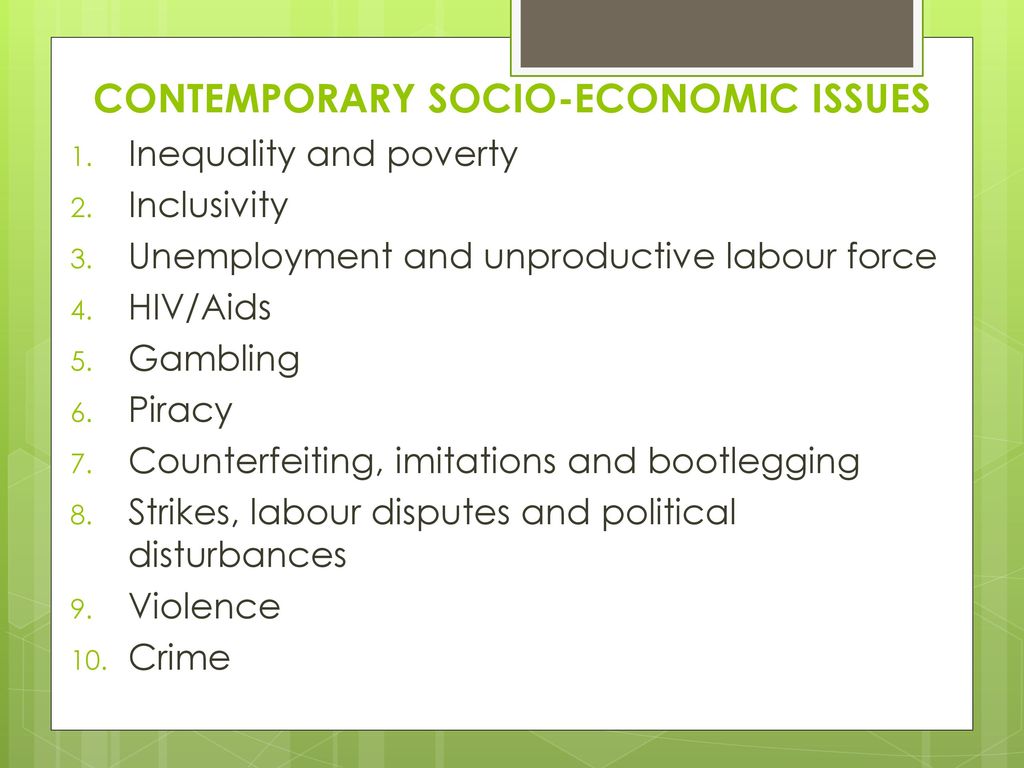Contemporary Socio-economic Issues

CONTEMPORARY SOCIO-ECONOMIC ISSUES
”Socio-economic issues are factors that have negative influence on an individuals' economic activity”
- Inequality and poverty
-Poverty is a state or condition in which a person or community lacks the financial resources and essentials for a minimum standard of living. Poverty includes lack of proper housing, clean water, proper sanitation, electricity, transport and a shortage of cash
-People in poverty stricken areas usually have poor living conditions, hunger and increased susceptibility disease
- Inequality is the degree to which people do not have the same opportunities and are treated differently because of their social status.
-Income inequality is defined as the difference in how income is distributed among individuals and/or populations. It is also described as the gap between rich and poor, leading to rich becoming richer and the poor becoming poorer.
Impact of poverty and inequality on business
- People do not have enough to live on and cannot participate fully in the economy.
- Poverty and inequality create a cycle where parents cannot afford to supply their children with good education, which means that they will grow up in poverty and remain in poverty because of a lack of education, skills, job opportunities and finance.
- This ultimately leads to a culture of crime and violence.
- As a result of poverty, businesses are targets of shoplifting, theft, burglary and corruption.
- This gives rise to industries such as security services, increasing business expenses.
- Inclusivity
Inclusivity is the practice or policy of providing equal access to opportunities and resources for people who might otherwise be excluded or marginalized, such as those having physical or mental disabilities or belonging to other minority groups. It means giving everyone opportunities without discriminating on the basis of age, race, gender, sexual orientation, disabilities or HIV status.
Aims of inclusivity
- To make the best use of all human resources in the organisation.
- To make use of people's different talents and skills.
- To decrease inequality.
- To increase education and training.
- To decrease poverty.
- To increase the number of middle-class people participating in the economy
Efforts to create an inclusive workforce
- The client base of organisations increases and becomes representative of the wider community.
- Organisations need to appoint people who can talk to and serve clients.
- Through this a more inclusive workforce is created.
- To speed up this process, the government approved the Employment Equity Act, which requires that employees must represent the wider community in terms of race, gender and disabilities.
- HIV and Aids
HIV and Aids is a virus that attacks cells in the immune system, which is our body’s natural defence against illness. It is an incurable disease transferred by means of body fluids such as blood and semen.
The impact of HIV/Aids on business
- The young and economically active people become HIV positive.
- Treatment is possible, but people take long to recover, leading to high absenteeism from the workplace.
An HIV-positive person does not get well completely and slowly becomes weaker. This causes:
- The productivity of the business to be lower as people with HIV/Aids work slower because of a lack of energy.
- The skilled labour force to be reduced due to loss of lives.
- The business to spend more money on skills training to replace the employees they lost.
- Gambling
‘Gambling is the wagering of money or something of material value on an event with an uncertain outcome with the primary intent of winning additional money and/or material goods.’ Examples include lottery tickets, scratch cards, slot machines, horse racing, Internet
The impact of gambling on business
- Financial difficulty, debt and bankruptcy
- Relationship breakdown leading to absenteeism
- Loss of productivity from employees who are depressed/ stressed.
- Crime (e.g. theft and fraud)